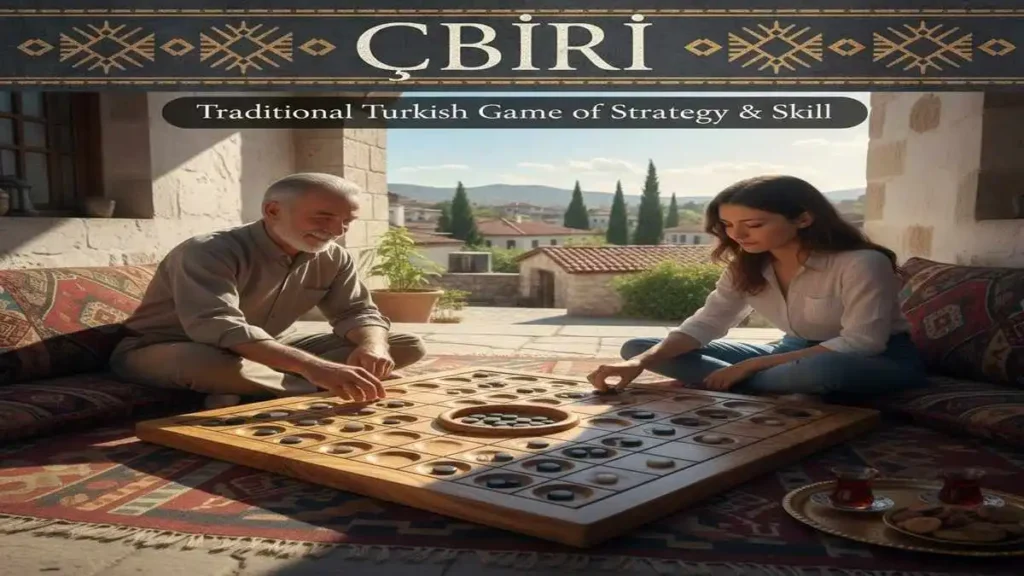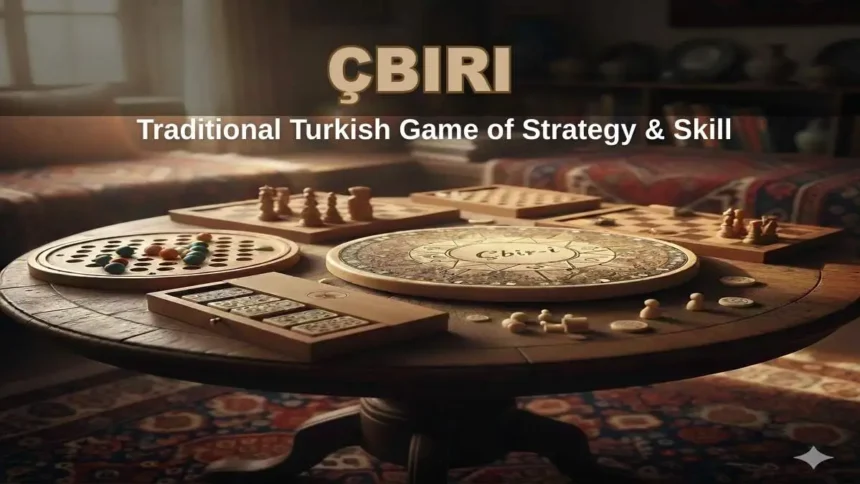Çbiri is an ancient Turkish strategy board game with origins tracing back to the nomadic Turkic tribes of Central Asia. Often likened to a combination of chess and checkers, it is a two-player game played on a square board, where the goal is to capture all the opponent’s pieces or block their movements. Beyond simple recreation, Çbiri fosters critical thinking, strategic planning, and problem-solving skills, while also serving as a cultural bridge, connecting generations through shared tradition and social interaction.
Origins and Historical Significance
Çbiri traces its roots to the nomadic Turkic tribes of Central Asia, where strategic thinking was vital for survival. Originally more than a game, it functioned as a tool for teaching young tribespeople critical skills such as foresight, patience, and tactical planning. Over centuries, Çbiri evolved as these communities settled in Anatolia, maintaining its role in social and cultural life. Beyond entertainment, it became a symbol of Turkish heritage, connecting generations while preserving the intellectual traditions and values of the nomadic past.
Gameplay and Rules
Though the exact rules of Çbiri are not universally agreed upon, practitioners and re-creators typically describe it as follows, based on the most commonly reported traditions and modern revivals.
Board and Pieces
- The game is played on a square board, often imagined as an 8×8 grid, akin to a chessboard.
- Each player commands a set of pieces, sometimes equal in number, each piece representing a “warrior” or “tribal token.”
Objective
- The primary aim is to capture all the opponent’s pieces, or to immobilize them, blocking any legal move, thereby achieving victory.
Movement and Capture
- Players move their pieces turn by turn. The movement is described as combining elements of both checkers and chess: simple pieces may move one square forward, sideways, or diagonally, depending on the variant.
- Capturing typically happens by “jumping” over an opponent’s piece—again reminiscent of checkers, but some reconstructions suggest that captures may be multi-step or chained, requiring a sequence of jumps.
Victory Conditions
- If one player loses all of his or her pieces, or is left with no possible moves, the other player wins.
- In some rule-sets, a draw may be declared if a stalemate persists, or a certain number of moves pass without any capture.
Because these rules vary depending on source and modern recreation, there is no single “canonical” rulebook for Çbiri. This flexibility, however, is part of its charm, allowing different communities to adapt the game to their own traditions.

Strategic Depth and Tactical Elements
Çbiri, as conceived in its modern revival, demands both positional thinking and dynamic tactics. Several aspects contribute to its richness:
- Piece Economy: Because pieces can be captured, players must balance aggressive attacks with defensive preservation. Trading rashly may leave one vulnerable later.
- Mobility vs. Control: The ability to promote pieces introduces a tension: should one strive to push simpler pieces to the back row, or retain them centrally for mobility?
- Blocking and Zugzwang: One path to victory is not just eliminating enemy tokens but immobilizing them, designing blockades so the opponent has no legal moves, reminiscent of chess endgames.
Thus, Çbiri is more than a mechanical contest; it is a battle of foresight, where power lies not just in material advantage but in positional harmony and prospective planning.
Cultural Impact and Social Relevance
Çbiri holds a special place in Turkish culture, fostering social interaction across generations. Traditionally played among family and friends, it serves as a medium for storytelling, teaching, and bonding, bridging the gap between young and old. The game is also featured in cultural festivals and local gatherings, reinforcing community ties. Beyond recreation, Çbiri preserves historical traditions and intellectual practices, making it not just a pastime but a living cultural heritage that strengthens social cohesion.
Educational Benefits of Çbiri
Çbiri is more than a game, it is a pedagogical tool. Its educational value is multifaceted:
- Critical Thinking: Players must analyze moves, anticipate consequences, and evaluate multiple scenarios simultaneously.
- Problem-Solving: Each game presents unique challenges, requiring creative solutions and adaptive strategies.
- Strategic Planning: Success depends on long-term planning and understanding the interconnectedness of individual actions.
In modern educational settings, traditional games like Çbiri are increasingly recognized for their ability to reinforce cognitive development without the need for digital screens, making them especially valuable in classrooms and family settings alike.
Challenges and Research Gaps
Despite Çbiri’s cultural and educational appeal, several challenges limit its wider recognition and preservation:
- Limited Historical Documentation: There are few archaeological or textual sources conclusively verifying it as an ancient Turkic game. Much of its origin is based on oral tradition and modern reconstructions.
- Rule Variability: Different interpretations and reconstructions of the game lead to inconsistencies in rules, movements, and victory conditions, making standardized play difficult.
- Lack of Academic Recognition: It has not yet been extensively studied in academic or ethnographic research, leaving gaps in scholarly understanding of its cultural and historical significance.
Why Çbiri Continues to Captivate Generations
Çbiri endures because it blends intellectual challenge with cultural tradition, appealing to both young and old. Its strategic gameplay fosters critical thinking, problem-solving, and foresight, while the social aspect encourages interaction among family and friends. The game’s accessibility and depth make it engaging for beginners and experts alike. By connecting players to centuries of Turkish heritage and offering a shared platform for learning and fun, it remains a beloved pastime that transcends time and modern distractions.
Final Thought
Çbiri is more than a traditional board game; it is a cultural treasure and a mental exercise that transcends generations. By combining strategy, foresight, and social interaction, it teaches critical thinking while preserving Turkish heritage. Its enduring appeal lies in its ability to connect past and present, offering both entertainment and education. For players, it is not just a game, it is a bridge to culture, intellect, and shared human experience.






